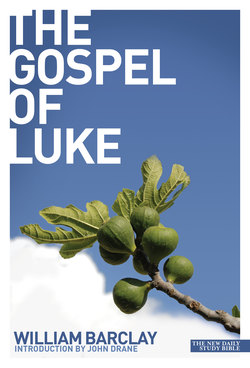Читать книгу Gospel of Luke - William Barclay - Страница 23
На сайте Литреса книга снята с продажи.
ОглавлениеTHE ANCIENT CEREMONIES ARE OBSERVED
Luke 2:21–4
When the eight days necessarily prior to circumcision had elapsed, he was called by the name of Jesus, the name by which he had been called by the angel before he had been conceived in the womb. When the time which, according to the law of Moses, must precede the ceremony of purification had elapsed, they brought him up to Jerusalem to present him to the Lord (in accordance with the regulation in the Lord’s law, ‘Every male that opens the womb shall be called holy to the Lord’) and to make the sacrifice which the regulation in the Lord’s law lays down, that is, a pair of doves or two young pigeons.
IN this passage we see Jesus undergoing three ancient ceremonies which every Jewish boy had to undergo.
(1) Circumcision. Every Jewish boy was circumcised on the eighth day after his birth. So sacred was that ceremony that it could be carried out even on a Sabbath when the law forbade almost every other act which was not absolutely essential; and on that day a boy received his name.
(2) The Redemption of the First-born. According to the law (Exodus 13:2) every first-born male, both of human beings and of cattle, was sacred to God. That law may have been a recognition of the gracious power of God in giving human life, or it may even have been a relic of the day when children were sacrificed to the gods. Clearly if it had been carried out literally, life would have been disrupted. There was therefore a ceremony called the Redemption of the First-born (Numbers 18:16). It is laid down that for the sum of five shekels – almost a month’s pay – parents could, as it were, buy back their son from God. The sum had to be paid to the priests. It could not be paid sooner than thirty-one days after the birth of the child and it might not be long delayed after that.
(3) The Purification after Childbirth. When a woman had borne a child, if it was a boy, she was unclean for forty days, if it was a girl, for eighty days. She could go about her household and her daily business but she could not enter the Temple or share in any religious ceremony (Leviticus 12). At the end of that time she had to bring to the Temple a lamb for a burnt offering and a young pigeon for a sin offering. That was a somewhat expensive sacrifice, and so the law laid it down (Leviticus 12:8) that if she could not afford the lamb she might bring another pigeon. The offering of the two pigeons instead of the lamb and the pigeon was technically called the Offering of the Poor. It was the offering of the poor which Mary brought. Again we see that it was into an ordinary home that Jesus was born, a home where there were no luxuries, a home where the cost of everything had to be considered carefully, a home where the members of the family knew all about the difficulties of making a living and the haunting insecurity of life. When life is worrying for us we must remember that Jesus knew what the difficulties of making ends meet can be.
These three ceremonies are strange old ceremonies; but all three have at the back of them the conviction that a child is a gift of God. The Stoics used to say that a child was not given to a parent but only lent. Of all God’s gifts there is none for which we shall be so answerable as the gift of a child.
